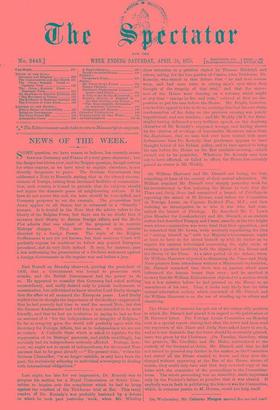Sir William Harcourt and Mr. Disraeli are losing, we fear,
something at least of the ecstacy of their mutual admiration. Sir William attacked Mr. Disraeli very sharply yesterday week for his inconsistency in first inducing the House to vote that the Times and Daily News had committed a breach of Privilege in reporting the attack of M. Herran, read before the Committee on Foreign Loans, on Captain Bedford Pint, M.P., and then ordering an investigation as to who it was who had com- mitted the breach of Privilege. He described Mr. C. Lewis (the Member for Londonderry) and Mr. Disraeli, as an ancient author had described Pompey and Ca3sar, namely, as the two bright stars whose conjunction was more fatal than their opposition ; and he remarked that Mr. Lewis, while modestly repudiating the idea of "mixing himself up" with her Majesty's Government, ought at least to have so far mixed himself up with its leader as to inquire his opinion beforehand concerning the right mode of treating a question involving both the dignity of the House and the liberty of the Press. At a later period of the debate, when Sir William Harcourt objected to dismissing the Times and Daily News printers from attendance without a Ministerial explanation, Mr. Disraeli remarked that there was no passion which more influenced the human breast than envy ; and he ascribed it to envy that Sir William Harcourt now objected to a motion which but a few minutes before he had pressed on the House as an amendment of his own. Thus it looks very likely that the little mutual-admiration society which consisted of Mr. Disraeli and Sir William Harcourt is on the eve of winding up its affairs and dissolving.


































